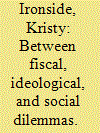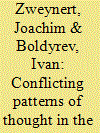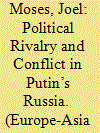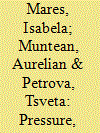| Srl | Item |
| 1 |
ID:
155303


|
|
|
|
|
| Summary/Abstract |
This article examines the ‘tax on bachelors, singles, and small families of the USSR’. The tax was introduced in 1941 to boost the birth rate and expanded in 1944 to finance the state’s benefits offered to mothers and children. The Ministry of Finance eventually moved away from its support for the regressive and inefficient bachelor tax and explored other tax-based strategies to boost the birth rate and support families. However, it was constrained in its reform efforts, both by Khrushchev and by ideas about the appropriate role of taxes as the Soviet Union progressed away from crisis and towards communism.
|
|
|
|
|
|
|
|
|
|
|
|
|
|
|
|
| 2 |
ID:
155306


|
|
|
|
|
| Summary/Abstract |
This article draws conclusions based on an analysis of the relationship between economic ideas and institutional change in Soviet and post-Soviet Russia, so far covering roughly the years from 1971 to 2007. It analyses the recent debate on economic modernisation in Russian economics. We argue that the relative failure of transition has to be seen in the context of a ‘failed transition of the mind’ and that the recent modernisation debate resembles the debate of the Brezhnev period.
|
|
|
|
|
|
|
|
|
|
|
|
|
|
|
|
| 3 |
ID:
155308


|
|
|
|
|
| Summary/Abstract |
The year 2015 throughout Russia was much less about what it seemed than what it revealed. On the surface, after the September 2015 combined regional and local elections, Russia appeared to be tranquil, politically disengaged, and supportive of President Vladimir Putin. The underlying reality was quite different. The election exposed a country divided by rivalry and a conflict of interests within the Russian political establishment set off by Putin’s own policies over the preceding two years. Since the election, Putin and the Kremlin have been confronting the challenge of balancing and containing the competing interests of institutions, levels of government, and establishment stakeholders who are less easily reconciled or controlled.
|
|
|
|
|
|
|
|
|
|
|
|
|
|
|
|
| 4 |
ID:
155304


|
|
|
|
|
| Summary/Abstract |
Georgia is the only country in the post-Soviet region where incarceration rates significantly grew in the 2000s. Then in 2013, the prison population was halved through a mass amnesty. Did this punitiveness and its sudden relaxation after 2012 impact attitudes to the law? We find that these attitudes remained negative regardless of levels of punitiveness. Furthermore, the outcomes of sentencing may be less important than procedures leading to sentencing. Procedural justice during both punitiveness and liberalisation was not assured. This may explain the persistence of negative attitudes to law. The Georgian case shows that politically-driven punitive turns or mass amnesties are unlikely to solve the problem of legal nihilism in the region.
|
|
|
|
|
|
|
|
|
|
|
|
|
|
|
|
| 5 |
ID:
155307


|
|
|
|
|
| Summary/Abstract |
This article examines the mix of non-programmatic strategies used by politicians to gain voter support in contemporary Eastern Europe. We use a mixed-method design that combines survey-based experiments and qualitative research in a paired comparison of localities in Romania and Bulgaria. Our article documents that the mix of clientelistic strategies differs across localities with different turnover rates. In both Romania and Bulgaria, we find that the use of clientelistic strategies that politicise state resources is higher in localities with long-term political incumbents.
|
|
|
|
|
|
|
|
|
|
|
|
|
|
|
|
| 6 |
ID:
155305


|
|
|
|
|
| Summary/Abstract |
This study examines gap—traditional reciprocal associations common in Central Asia. Gap is an unofficial, regular get-together of people of similar age bound by socially acknowledged ties. The study argues that gap represents a communal type of civil society featuring many differences from analogous groups in Western liberal societies. Gap may effect social consciousness and facilitate mobilisation. The study also analyses modern forms of gap such as joint savings funds, female-only get-togethers, and internet-based gap.
|
|
|
|
|
|
|
|
|
|
|
|
|
|
|
|